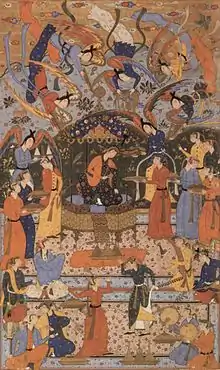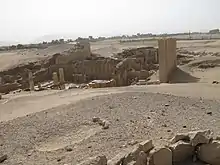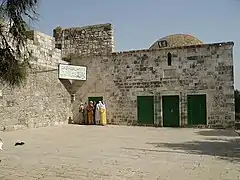Solomon in Islam
Sulaymān ibn Dāwūd (Arabic: سُلَيْمَان بْن دَاوُوْد, Solomon son of David) was, according to the Quran, a Malik (مَلِك, King) and Nabī (Prophet) of the Israelites. Islamic tradition generally holds that he was the third King of Jewish people, and wise ruler for the nation.[1]
 Sulaymān's name in Islamic calligraphy | |
| Born | |
| Died | Jerusalem, the Levant |
| Resting place | Al-Ḥaram Ash-Sharīf ("The Noble Sanctuary"), Jerusalem |
| Other names | Shlomoh (Hebrew: שְׁלֹמֹה) Shlemun (Syriac: ܫܠܝܡܘܢ) Solomon (Greek: Σολομών) Greek: Salomon |
| Known for | Being a Prophet and King of Israel |
| Title | King of Israel |
| Predecessor | Dawud (David) |
| Parent(s) |
|
Part of a series on Islam Islamic prophets |
|---|
 |
|
|
| Part of a series on |
| Islam |
|---|
 |
|
Islam views Solomon as one of the elect of God, who was bestowed upon with many God-given gifts, including the ability to speak to animals and jinn. Muslims further maintain that he remained faithful to a one and only God throughout his life; and reigned justly over the whole of the Israelites; was blessed with a level of Kingship which was given to none after him and before him; and fulfilled all of his commandments, being promised nearness to God in Paradise at the end of his life.[2] Arab historians regarded Solomon as one of the greatest rulers around the world.[3]
Narrative in the Quran
Judgment on the field
In the earliest narrative involving Solomon, the Qur'an (21:78) briefly alludes to a story that Solomon was in the company of his father, when two men came to ask David to judge between them regarding a ḥarth (حَرْث, field).[4] Later Muslim commentators expanded on the allusion, including Al-Tabari, Baidawi, and Ibn Kathir.[5][6][7] They said that the first of the two men said that he owned a vineyard of which he took great care the whole year through. But one day, when he was absent, the other man's sheep had strayed into the vineyard and devoured the grapes. He asked to be compensated for this damage.[8] Upon hearing the man's complaint, Solomon suggested that the owner of the sheep take the other man's vineyard to repair and cultivate until the vines returned to their former state, whereupon he should return it to its owner. At the same time, the owner of the vineyard would care for the sheep and benefit from their wool and milk until his land was returned to him, at which point he would return the sheep to their owner. Solomon's level of judgment, which the Quran says in this particular incident surpassed that of David,[9] would characterize Solomon throughout his life. Ḥikmah (Wisdom), according to Muslim tradition, would always be associated with Solomon, who would later even be referred to as Sulaimān al-Ḥakīm (سُلَيْمَان ٱلْحَكِيْم, "Solomon the Wise"). This story is adapted in the Kebra Nagast, but as a dispute adjudicated by a son of Solomon's.[6]
Reign

When David died, Solomon inherited his position as the Prophetic King of the Israelites. He prayed to God to grant him a Kingdom which would be unlike any after him.[10] God accepted Solomon's prayer and gave him what he pleased. It was at this stage that Solomon began to acquire the many gifts that God would bestow upon him throughout his life. The Qur'an narrates that the wind was made subservient to Solomon,[11] and he could control it at his own will, and that the jinn also came under Solomon's control. The jinn helped strengthen Solomon's reign, and the unbelievers among them along with the Shaitan [12] were forced building for him monuments.[13] God also caused a miraculous ʿayn (عَيْن, 'fount' or 'spring') of molten qiṭr (قِطْر, 'brass' or 'copper') to flow for Solomon, to be used by the jinn in their construction.[11]
Solomon was even taught the languages of various animals, such as ants. The Quran recounts that, one day, Solomon and his army entered a wādin-naml (وَادِ ٱلْنَّمْل, valley of the ant). On seeing Solomon and his army, a namlah (نَمْلَة, female ant) warned all the others to "... get into your habitations, lest Solomon and his hosts crush you (under foot) without knowing it."[14] Immediately understanding what the ant said, Solomon, as always, prayed to God, thanking Him for bestowing upon him such gifts[15] and further avoided trampling over the ant colonies.[16][17] Solomon's wisdom, however, was yet another of the gifts he received from God, and Muslims maintain that Solomon never forgot his daily prayer, which was more important to him than any of his gifts.
Conquest of Saba'

Another important aspect of Solomon's kingship was the size of his army, which consisted of both men and jinn. Solomon would frequently assess his troops and warriors as well as the jinn and all the animals who worked under him. One day, when inspecting his troops, Solomon found the Hud-hud (هُدْهُد, Green peafowl or Hoopoe) missing from the assembly.[18] Shortly later, however, the Hud-hud arrived to Solomon's court, saying "I have compassed (territory) which thou hast not compassed, and I have come to thee from Saba' with tidings true."[19] The Hud-hud further told Solomon that the people of Sheba worshiped the Sun, but that the woman who ruled the Kingdom was highly intelligent and powerful. Solomon, who listened closely, chose to write a letter to the land of Sheba, through which he would try to convince the people of Sheba to cease in worshiping the Sun, and to come to the worship of God. Solomon ordered the Hud-hud to give the letter to the Queen of Sheba, and then to hide and observe her reaction.[20] The Hud-hud accepted Solomon's orders, and flew to give the letter to her. The Queen then called her ministers in the court and announced the letter of Solomon stating to the people of Sheba: "In the name of Allah the Compassionate the Merciful, Be you not exalted against me, but come to me as Muslimīn (مُسْلِمِيْن)." She asked for suggestions from her minister and administration stating that "O my people, I know that you all are powerful and brave warriors, and no one on the face of the Earth can defeat our army, but still I want your opinion." The people of the court replied: "You have all the power, and whatever order you deliver, you will find us obedient." Eventually, however, the Queen came to Solomon, announcing her submission to God.[21]
Death

The Qur'an relates that Solomon died while he was leaning on his staff. As he remained upright, propped on his staff, the jinn thought he was still alive and supervising them, so they continued to work. They realized the truth only when Allah sent a creature to crawl out of the ground and gnaw at Solomon's staff until his body collapsed. The Qurʾan then comments that if they had known the unseen, they would not have stayed in the humiliating torment of being enslaved.
According to the Qur'an, the death of Solomon was a lesson to be learned:
Then, when We decreed (Solomon's) death, nothing showed them his death except a little worm of the earth, which kept (slowly) gnawing away at his staff: so when he fell down, the Jinn saw plainly that if they had known the unseen, they would not have tarried in the humiliating Penalty (of their Task).
Mahammaddim in the Song of Solomon
As inspired by verses of the Qur'an, some Muslims insist that Muhammad (Arabic: مُحَمَّد, consonant letters: m-ħ-m-d) is mentioned in the Song of Songs (5:16) as 'Mahammaddim' (Hebrew: מַחֲמַדִּים, consonant letters: m-ħ-m-d-y-m), even though the latter word is usually translated as "desirable" or "lovely".[23]
Solomon and Jamshid
_(cropped).jpg.webp)
According to the Shāhnāma of the poet Firdausī, Jamshid was the fourth king of the world. He had command over all the angels and demons of the world, and was both king and high priest of Hormozd (middle Persian for Ahura Mazda). He was responsible for a great many inventions that made life more secure for his people: the manufacture of armor and weapons, the weaving and dyeing of clothes of linen, silk and wool, the building of houses of brick, the mining of jewels and precious metals, the making of perfumes and wine, the art of medicine, the navigation of the waters of the world in sailing ships. He Jamshid had now become the greatest monarch the world had ever known. He was endowed with the royal farr (Avestan: khvarena), a radiant splendor that burned about him by divine favor. Due to similarities said about Solomon, they have been conflated in later Islamic traditions. For example Solomon was associated with ruling over the southwestern Iran in the works of al-Balkhi. Persepolis was believed the be the seat of Solomon and described as "playground of Solomon" by scholars such as Mas'udi, Muqaddasi and Istakhri.[24][25]
See also
- Biblical narratives and the Quran
- Harut and Marut
- Legends and the Quran
- Qiṣaṣ al-Anbiyāʾ ("Stories of the Prophets")
- Queen of Sheba
- Sulayman
- Sūrat an-Naml ("Chapter of the Ant")
- The Kingdom of Solomon (Iranian film)
References to Solomon in the Quran
- Appraisals for Solomon: 2:102, 6:84, 21:81–82, 27:15–16, 27:18–23, 27:36–39, 27:44, 34:12–13, 38:30–31, 38:35–40
- Solomon's preaching: 4:163, 27:25, 27:31, 27:44
- Solomon judged: 21:78–79
- Fitnah to Solomon: 38:32–34
- Solomon and the Queen of Sheba: 27:28–31, 27:34–44
- The Kingdom of Sheba: 27:23, 34:15, 34:18
- Solomon's death: 34:14
References
- Concise Encyclopedia of Islam - Page 374, Cyril Glasse - 1988
- Quran 38:40
- Walker, J. and Fenton, P. (2012). "Sulaymān b. Dāwūd". In P. Bearman; Th. Bianquis; C.E. Bosworth; E. van Donzel; W.P. Heinrichs (eds.). Encyclopaedia of Islam (2nd ed.). Brill. doi:10.1163/1573-3912_islam_SIM_7158.CS1 maint: uses authors parameter (link)
- Quran 21:78
- Helewa, Sami (2017-11-01). Models of Leadership in the Adab Narratives of Joseph, David, and Solomon: Lament for the Sacred. Lexington Books. ISBN 978-1-4985-5267-7.
- Hubbard, David Allan (1956). The literary sources of the Kebra Nagast (Thesis thesis). University of St Andrews. hdl:10023/544.
- Wheeler, Brannon (2002-06-01). Prophets in the Quran: An Introduction to the Quran and Muslim Exegesis. A&C Black. ISBN 978-1-4411-0405-2.
- Lives of the Prophets, L. Azzam, David and Solomon, pg. 62, Suhail Academy
- Quran 21:79
- Quran 38:35
- Quran 34:12
- Robert Lebling Legends of the Fire Spirits: Jinn and Genies from Arabia to Zanzibar I.B.Tauris 2010 ISBN 978-0-857-73063-3
- Quran 34:13
- Quran 27:18
- Quran 27:19
- Lives of the Prophets, L. Azzam, David and Solomon, pg. 63, Suhail Academy
- Deen, Mawil Y. Izzi (1990). "Islamic Environmental Ethics, Law, and Society" (PDF). In Engel JR; JG Engel (eds.). Ethics of Environment and Development. Bellhaven Press, London. Archived from the original (PDF) on 2011-07-14.
- "Qur'an, 27: 15 – 19".
- Quran 27:22
- Lives of the Prophets, L. Azzam, David and Solomon, pg. 64, Suhail Academy
- "Qur'an, 27: 15 – 44".
- Quran 34:14
- Richard S. Hess; Gordon J. Wenham (1998). "Teaching the Old Testament in the Context of Islam". Make the Old Testament Live: From Curriculum to Classroom. Wm. B. Eerdmans Publishing. pp. 138–139. ISBN 978-0-8028-4427-9. Retrieved 4 April 2013.
- Eva Orthmann, Anna Kollatz The Ceremonial of Audience: Transcultural Approaches Vandenhoeck & Ruprecht, 11.11.2019 isbn 978-3-847-00887-3 p. 155
- M. Cook, N. Haider, I. Rabb, A. Sayeed Law and Tradition in Classical Islamic Thought: Studies in Honor of Professor Hossein Modarressi Springer, 06.01.2013 isbn 978-1-137-07895-7 p. 256